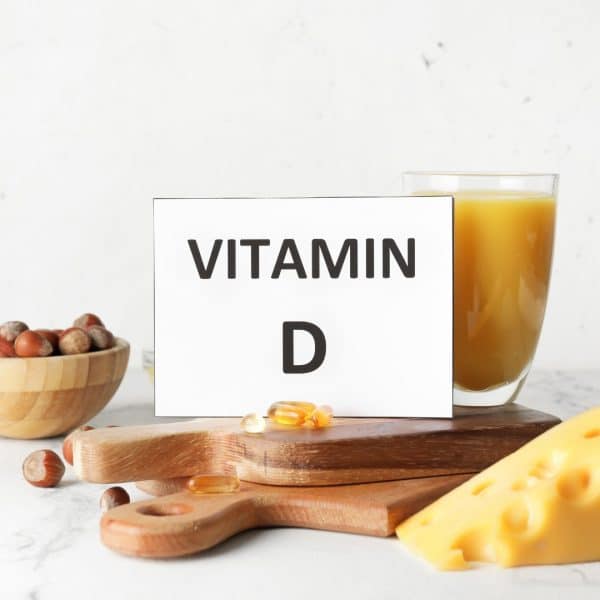Ugh! Is it just me or are these cold winter months absolute torture for getting out of bed when your autoimmune symptoms are flaring? Between the brain fog and painfully stiff joints, motivation feels hard to come by.
Believe me, I’ll never forget those days! But what if I told you that fixing a common vitamin deficiency could help reduce some of that inflammation and misery? Read on to learn more about the link between low Vitamin D and autoimmune diseases.

What Do We Know About This Sunshine Vitamin?
Before we dive into the autoimmune connection, let’s start with a little Vitamin D 101.
Vitamin D is dubbed the sunshine vitamin because our main source comes from the ultraviolet B rays of sunlight interacting with our skin. About 10-15 minutes of direct sun exposure daily is often enough for most people’s bodies to produce sufficient amounts. Food sources like fatty fish, eggs, and vitamin D-fortified products like milk also pitch in.
We’ve long known that vitamin D is crucial for bone health by helping our bodies absorb calcium effectively. But with rates of autoimmune conditions skyrocketing among middle-aged adults, scientists are now taking a closer look at vitamin D’s potential role in immune regulation as well. Let’s walk through what the research says so far.

Vitamin D and Your Bad*ss Immune System
Our immune systems are designed to protect the body against any invading cooties or germs, but did you know vitamin D acts as a bit of a behind-the-scenes bouncer? It helps signal our cytokine and T-cell first responders not to overreact unnecessarily. Pretty cool, right?
In the case of autoimmunity, that regulation system goes haywire—attacking our healthy cells instead of foreign invaders. Experts now believe ensuring adequate vitamin D levels may help calm things down by:
– Boosting T-reg cells that prevent excessive immune reactions
– Quieting down inflammatory cytokine activity
– Maintaining the integrity of the intestinal barrier
The problem is, that studies indicate anywhere from 40-90% of people with conditions like rheumatoid arthritis, lupus, and Crohn’s disease are deficient in this mighty vitamin. Let’s see what the research implies about repleting vitamin D stores and autoimmune management.

The Link Between Low Vitamin D And Autoimmune Diseases
Multiple peer-reviewed studies over recent years have uncovered some striking correlations between low vitamin D status and autoimmune diagnosis or symptom severity. For example:
– Multiple sclerosis: Research found developing MS 2-3x more likely if you have deficient Vitamin D levels
– Type 1 diabetes: Babies with deficiency at birth had higher type 1 diabetes rates later on
– Rheumatoid arthritis: 75% of RA patients are severely vitamin D deficient
– Lupus: An inverse relationship is seen—the lower the Vitamin D, the higher the lupus activity
The million-dollar question remains—are vitamin D losses causing more aggressive autoimmune disease? Or is low vitamin D a byproduct of underlying inflammation? Either way, optimizing levels correlates with better patient-reported symptom scores according to several Gold Standard randomized controlled studies.
Now that you know what the science says so far about the connection, let’s talk turkey about getting your levels tested and your Vitamin D intake on point.

Testing and Diet Tips
If you suffer from fatigue, widespread pain, or other inflammatory issues and haven’t had your vitamin D status checked—make doing so Job #1 this year. While experts debate the exact threshold, a level between 50-80 ng/ml is typically considered sufficient. Ask your physician to order the 25-hydroxyvitamin D blood test.
While increasing vitamin D-rich foods is your first line of defense, studies demonstrate many patients don’t get nearly enough from diet alone to reach optimal range.
Here are my top tips:
Focus on Fatty Fish
– Aim for at least two 3.5oz servings per week of salmon, tuna, mackerel, sardines, trout, or herring. These contain about 250-500IU vitamin D per serving.
Opt for Vitamin D-Fortified Foods
– Many dairy products like milk, yogurt, orange juice, cereals, breads, and plant-based milk alternatives are fortified with about 100-130IU vitamin D per serving. Check labels.
Choose Mushrooms Exposed to UV Light
– Certain mushrooms produce vitamin D when exposed to ultraviolet light. Varieties labeled “D-enhanced” can provide 100IU per 3oz serving.
Cook with Cod Liver or Fish Liver Oil
– Use a teaspoon of cod/fish liver oil to sauté veggies or in salad dressings a couple of times a week. Each tsp contains about 450-500IU vitamin D.
Top Dishes with Eggs
– Eggs are naturally rich in vitamins D and A. Prepare sunny-side-up eggs, slice hard-boiled eggs into salads, or sprinkle scrambled eggs onto soups. Two large eggs provide about 40IU.
Maximize Sunshine!
– Exposure to UVB rays from sunlight remains our best natural source. Just 10-15min a few times per week can suffice when sunshine permits.
Pairing a vitamin D focus with an overall balanced anti-inflammatory diet gives the best results for supporting immune health and autoimmunity. Speak to your dietitian or doctor regarding the possible need for supplementation depending on your Vitamin D levels and medical history.
Conclusion: The Link Between Low Vitamin D And Autoimmune Diseases
After taking a deep dive into exploring the mounting research linking insufficient vitamin D status and increased autoimmune disease risk or symptoms, let’s recap the key takeaways:
First and foremost—if you are one of the ever-growing numbers diagnosed with an autoimmune condition, prioritizing your vitamin D level testing should now be at the very top of your health to-do list. As we reviewed, studies demonstrate a staggeringly high prevalence—up to 90% in some immune-mediated diseases—of vitamin D deficiency among these patients compared to the general public.
Even in the early stages of research, scientists can already definitively state restoring optimal vitamin D levels correlates to better patient reports of reduced inflammatory pain, less fatigue, and improved quality of life. And emerging evidence suggests that maintaining higher blood concentrations could potentially help regulate dysfunctional immune responses over the long term as well.
While mending every leaky gut, cleansing every lymph node, or providing a transplant for each haywire thyroid may not be feasible—replenishing vitamin D reserves assuredly IS. It represents one simple, affordable, and often overlooked step on the journey back toward wellness.
Now, does vitamin D deserve all the credit for healing complex, chronic illnesses? Certainly not. No magic bullet or “cure-all” exists when it comes to winding down autoimmunity. However, recognizing vitamin D’s role as one influential player on a team working toward the same goal of balanced immunity cannot hurt. It just makes sense physiologically and the data demonstrates it time and again clinically.
Of course, run any proposed routine blood panels or supplementation by your trusted healthcare providers first to determine if they’re appropriate given your unique medical history. But don’t resign yourself to continuing feeling cruddy indefinitely either. Don’t remain in the dark on your vitamin D status! Arm yourself with knowledge and take back a sense of control amidst the uncertainty of autoimmunity.
Wishing each of you brighter, less painful days ahead fueled by an unrelenting determination to uncover every factor contributing to your symptoms—including how correcting vitamin D deficiency could help turn down your immune fires from raging wildfire to nurturing campfire once more.
Now I’m off to take my advice and safely soak up a few of those soul warming sunbeams. Catch you next time!
Need More Support?
If you’ve been searching for a supportive community, Listen up! I don’t know your autoimmune struggle, but I do know YOU deserve to thrive, not just survive.
As a woman over 40 managing one of these fickle fiery conditions, taking back a sense of kick*ss control feels pretty empowering. So let’s work together to DO JUST THAT!
Introducing…*cue flashy graphics*… Thrive Beyond Inflammation! This hot-off-the-press monthly membership was created for go-getters like YOU who refuse to let pesky ole inflammation steal your shine.
Each month I’ll be bringing you:
✅ In-depth training videos unpacking the latest autoimmune management research
✅ Loads of helpful tips and resources
✅ Access to our rockstar private community offering REAL talk, inspiration, laughs, and sisterhood
Consider your days of guessing at half-baked Dr. Google advice O-V-E-R!
So are you finally ready to take control and master the ins and outs of life beyond inflammation? Then check out the membership and learn more.
Get on the waitlist today and be the first to know when it opens up. The first step begins with YOU!


